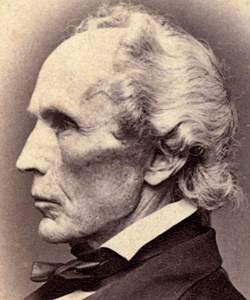Garret Davis (American National Biography)
Scholarship
In December 1861 Davis's passionate nature paid off when the Kentucky legislature elected him to the U.S. Senate, in part because of his energetic activities on behalf of the Union. In the spring of 1861 he had served as Abraham Lincoln's agent in the distribution of rifles to Union partisans in Kentucky. During the early stages of his senatorial career, he continued his spirited embrace of Lincoln and the Union. However, as the conflict grew more radical in nature and came to encompass emancipation as an objective, Davis, a slave owner, abandoned his commitment to the president and his policies. In early 1864 he introduced resolutions in the Senate that described Lincoln and his supporters as destroyers of the Constitution who were violating civil liberties, plundering the treasury, and perpetuating the spoils system. So intemperate were these resolutions that they nearly resulted in Davis's expulsion from the Senate. His bigotry and sarcasm also were in evidence when he offered an amendment to the proposed Thirteenth Amendment, which, if adopted, would have denied U.S. citizenship to African Americans and consolidated the states of New England into two states, East and West New England (the latter proposal doubtless being a tongue-in-cheek attempt to reduce the political power of a region of "radical" Yankees). He likewise strenuously opposed the involvement of the Union army in state elections, a growing controversy in his home state.
Robert M. Ireland, "Davis, Garret," American National Biography Online, February 2000, http://www.anb.org/articles/04/04-00296.html.
Garrett Davis (Congressional Biographical Directory)
Reference
DAVIS, Garrett, (brother of Amos Davis), a Representative and a Senator from Kentucky; born in Mount Sterling, Ky., September 10, 1801; completed preparatory studies; employed in the office of the county clerk of Montgomery County and afterward of Bourbon County; studied law; admitted to the bar in 1823 and commenced practice in Paris, Ky.; member, State house of representatives 1833-1835; elected as a Whig to the Twenty-sixth and to the three succeeding Congresses (March 4, 1839-March 3, 1847); chairman, Committee on Territories (Twenty-seventh Congress); declined to be a candidate for reelection in 1846; resumed the practice of law and also engaged in agricultural pursuits; declined the nomination for lieutenant governor in 1848; declined the American Party nomination for governor in 1855 and for the presidency in 1856; was opposed to secession and supported the Constitutional Union ticket in 1860; elected as a Unionist in 1861 to the United States Senate to fill the vacancy caused by the expulsion of John C. Breckinridge; reelected as a Democrat in 1867 and served from December 10, 1861, until his death in Paris, Bourbon County, Ky., September 22, 1872; chairman, Committee on Private Land Claims (Forty-second Congress); interment in Paris Cemetery.
"Davis, Garrett," Biographical Directory of the United States Congress, 1774 to Present, http://bioguide.congress.gov/scripts/biodisplay.pl?index=D000099.



